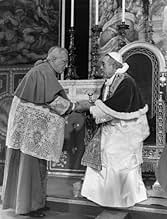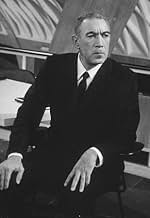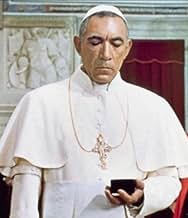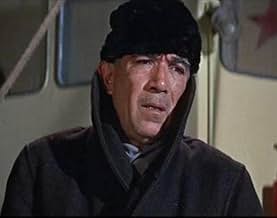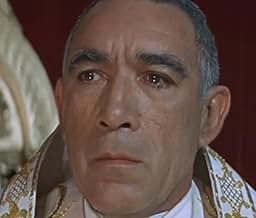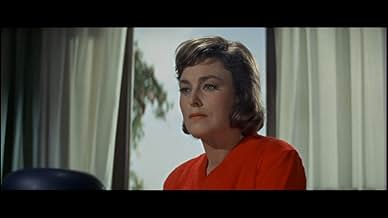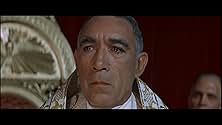After spending decades in a Siberian Gulag labor camp, Roman Catholic priest Kiril Lakota is set free by Russian leader Piotr Ilyich Kamenev at the height of the Cold War.After spending decades in a Siberian Gulag labor camp, Roman Catholic priest Kiril Lakota is set free by Russian leader Piotr Ilyich Kamenev at the height of the Cold War.After spending decades in a Siberian Gulag labor camp, Roman Catholic priest Kiril Lakota is set free by Russian leader Piotr Ilyich Kamenev at the height of the Cold War.
- Director
- Writers
- Stars
- Nominated for 2 Oscars
- 4 wins & 5 nominations total
- Piotr Ilyich Kamenev
- (as Sir Laurence Olivier)
- The Elder Pope
- (as Sir John Gielgud)
- Chiara
- (as Rosemarie Dexter)
- Gelasio
- (as Arnoldo Foa')
- Gorshenin
- (credit only)
- Director
- Writers
- All cast & crew
- Production, box office & more at IMDbPro
Featured reviews
The film draws the viewer into the movie with scenes we have often witnessed from St. Peter's Square of huge crowds at the time of a pope's death and the subsequent election of his successor. David Jansen is the erudite broadcaster talking to American audiences about the workings of the Vatican and the progress of events. There are the processions through the square, close-ups of statues around the square, puffs of black and white smoke telling onlookers the status of the balloting, and the tolling of bells. The movie goes behind the scenes and takes the viewer back to the square with the throngs waiting in anticipation until the drama is over. In this film, it reaches a finale with the coronation and in particular, the words of the new pope.
I found the pomp and pageantry and the sacred traditions surrounding the death of a pope and the election of a successor to be well described and displayed. The inquisitorial nature of the pontifical commission grilling the Oscar Werner character is what we are given to believe about the Vatican's treatment of theologians. Werner was outstanding in his role as an avant grade theologian breathing new life into church dogma against the rather staid and anti-intellectual Vatican insiders. Vittorio de Sica was excellent as the urbane Secretary of State. Leo McKern, as the conservative Cardinal Leone, was shown to be a man with some foresight and compassion. John Gielgud had a brief but impressive role as the aging pope welcoming Kiril Lakota to the Vatican. A large-scale movie with an excellent cast, I would gladly see the it again.
The performance of Anthony Quinn as Kiril I is truly outstanding -- his Ukrainian accent, his almost mystical yet practical manner and his eloquent speeches make this an Oscar-worthy performance (why he wasn't nominated, I'll never know). Oskar Werner as Fr. Telemond was equally touching. Flattered at being chosen to be the pope's friend, secretary and confidant, he comes to realize he has taught the pope many things while learning a few things himself. Thinly based on the life of Fr. Pierre Teilhard de Chardin, Oskar Werner gives a moving performance as the terminally ill, brilliant but troubled priest-philosopher-thinker. This is by no means a perfect movie --- some of the clothes are dated and the music at the party where the reporter meets up with his mistress is annoying. But minor flaws aside, this is a wonderful movie that gives tremendous insight into the workings of the Vatican, the papacy and even the human heart.
This is a moving but overlong film and in some moments results to be dull ; based on Morris L. West's best seller that contains drama , interesting world policy , emotion and historical events . Good film with thought-provoking issues and dealing with an Ukrainian's rise from a simple imprisoned priest to the college of Cardinals until becoming Pope . The film is pretty well but being wasted by a loving triangular drama between a reporter , spouse and girlfriend . Very good acting by Anthony Quinn as Pope Kiril I who must now deal with a lot of problems as his own self-doubt , the struggle of his friend priest and tries to fend off atomic war ; this type of treatment was a big turning point for Quinn . Reference is made to Kiril being the first non-Italian pope to be elected since Adrian VI 400 years earlier . In real life, this happened 10 years after this film was released with the election of Pope John Paul II .
The footage showing the arrival of the Cardinals and the crowds gathering in St. Peter's Square is taken from news reels and other archive films that documented the events between the death of Pope John XXIII and the election of Pope Paul VI in 1963 . Colorful and evocative cinematography by Erwin Hillier , filmed in Panavison . Rousing score by Alex North , though he reused the opening fanfare he wrote for 2001 (1968) but which had been rejected by Stanley Kubrick, as one of the main themes in his soundtrack . This epic point of view of a rise of an obstinate locked priest from a Siberian prison until Cardinal and Pope was well directed directed by Michael Anderson though emerge some flaws , being alternately compelling and uneven .
Did you know
- TriviaIn the scene where Pope Kiril I (Anthony Quinn) prays over the body of the Jewish man, he recites the Shema. However, rather than say "Adonai," he says, "Hashem." This is because "Adonai" is traditionally only said when one is actually at prayer, and not simply reciting a prayer in a secular context, as in during a performance (specifically, in a movie).
- GoofsIn an on-air report, George Farber states, "after the sixth ballot, still only black smoke from the window of the Sistine Chapel." As a preceding shot demonstrated, the smoke rises from a stove pipe on the roof of the Sistine Chapel, not from a window.
- Quotes
George Faber: Were you permitted to practice your ministry as a priest?
Kiril Lakota: No, I - I practiced it without permission among my fellow prisoners.
George Faber: Do you see any hope then for the day when Christian faith, or more specifically the Roman Catholic faith, may be practiced freely in Marxist countries?
Kiril Lakota: I have no inside information as to how the Kingdom of God is going to be established.
- ConnectionsFeatured in The Shoes of the Fisherman (1968)
- How long is The Shoes of the Fisherman?Powered by Alexa
Details
- Release date
- Country of origin
- Languages
- Also known as
- Las sandalias del pescador
- Filming locations
- PalaLottomatico, Rome, Lazio, Italy(meeting with Chinese leader)
- Production company
- See more company credits at IMDbPro
- Runtime2 hours 42 minutes
- Sound mix
- Aspect ratio
- 2.35 : 1
Contribute to this page



